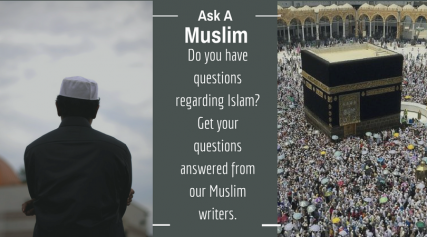What do you want to Ask a Muslim? Submit your questions online or fill out the form below.
Are there rules about how a woman must wear a hijab? Like, does it need to cover the neck and/or face? Do certain styles or colors matter?
Very shortly put: it is down to personal choice. A hijab is a veil or head covering worn by some Muslim women; it is worn when in the presence of unknown or known males who are other than a husband, father, son, step-son, grandfather, father-in-law, nephew or son-in-law. Having said that, a hijab is more than just a headdress. It signifies the wearer’s commitment to self, religion and philosophy of faith. Women who don the hijab say they find it liberating, and that it allows them to be themselves.
The Quran refers to the hijab as a metaphorical curtain or partition, and there are many types of hijab. The first most commonly worn is a square scarf that covers the head and neck, but leaves the face bare – this is called the hijab. The khimar, is a long almost cape like scarf that wraps around the head and then is left hanging in the middle of the back. It covers the head and neck, but leaves the face bare. A chador is basically a long cloak that would cover the entire body; it wraps around the head and drapes all the way down to the feet. A niqaab is worn in conjunction with a khimar or hijab, covers the mouth and nose but leaves the eyes open/clear. A burqa covers the entire head and body, and has a mesh screen through which the woman wearing it, can see.
Women wear the hijab as a choice. It is not a sign of oppression and they are not forced to wear it. Some wear it in deference of family traditions and because they are ‘expected’ to wear it, however, it is a choice. Most women wear it because they believe they are fulfilling God’s commandment for donning modest clothing. They choose to wear it as a personal statement – whatever that may be. Some women wear it as a cultural identity, and others for religious reasons.
As far as I could research, there are no specific rules about how a woman should wear a hijab. So long as it covers her hair and is worn modestly, styles and colors are down to personal choice, and often times change with every outfit.
What questions do you have about Islam? Submit them here.
If everyone who reads and appreciates FāVS, helps fund it, we can provide more features like this. For as little as $5, you can support FāVS – and it only takes a minute. Thank you.
[give_form id=”53376″ show_title=”true” display_style=”button”]








Sequel to your ruling on hijab (outer covering) by Muslims women. In the article you have explain different types of covering like hijab, Niqab, Kumar and burqa. It was also mentioned that is suppose to be a choice and not force and you have not seen any preceding Islamic ruling that makes it compulsory, if I understand you very well. My question is can you explain the Quran chapter Ahzab 33:59 ? The chapter talk about covering of the body is that not a clear evidence about hijab and makes it compulsory?
I want to share with you a very important prophecy going around the web concerning the RFID chip and the Mark of the Beast from Revelation 13:16-18.
We are approaching the future of a cashless society and RFID Microchip technology is on the horizon. You need to see this! It is unbelievable how accurate the Bible is concerning this RFID technology with the Mark of the Beast. It is right on!
Also, this article shares the hidden meaning behind the number 666 with fascinating calculations that line up with the Bible.
Click here to view the article: https://www.biblefreedom.com/rfid-mark-revealed
Best what world can have , is Girls !
I was recommended this web site by means of
mmy cousin. I am now not certain whether or not this
put up is written through hiim as nobody else recognize such exact approximately my problem.You’re wonderful!
Thanks!
Thanks so much for explaining that women are not forced to wear a hijab because that really helps me understand it better. I was curious about hijabs because I have a friend who wears one. It’s such an interesting culture, so I’m glad I could learn more about it.
Hello, after reading this awesome piece of writing i am as well delighted to share my familiarity here with colleagues.
Maybe also put a tab about the Quran in English and Islam culture languages